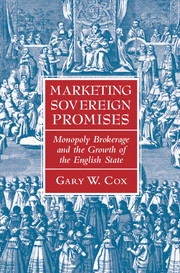Book contents
- Frontmatter
- Contents
- List of Tables and Figures
- Preface
- 1 Sovereign Credibility and Public Revenue
- PART I THE GLORIOUS REVOLUTION AND THE ENGLISH STATE
- PART II THE ENGLISH CONSTITUTIONAL DIASPORA
- 10 Exporting the Revolution – The Early Adopters
- 11 Exporting the Revolution – The Late Adopters
- 12 Good Political Institutions
- References
- Index
- Miscellaneous Endmatter
10 - Exporting the Revolution – The Early Adopters
from PART II - THE ENGLISH CONSTITUTIONAL DIASPORA
Published online by Cambridge University Press: 05 May 2016
- Frontmatter
- Contents
- List of Tables and Figures
- Preface
- 1 Sovereign Credibility and Public Revenue
- PART I THE GLORIOUS REVOLUTION AND THE ENGLISH STATE
- PART II THE ENGLISH CONSTITUTIONAL DIASPORA
- 10 Exporting the Revolution – The Early Adopters
- 11 Exporting the Revolution – The Late Adopters
- 12 Good Political Institutions
- References
- Index
- Miscellaneous Endmatter
Summary
“He who … reduces the budget to such a point that the whole business of government comes to an end, is only fit for a madhouse.” – King Wilhelm I of Prussia, 1863 (quoted in Bismarck 1899, p. 336).
The Glorious Revolution is perhaps the single most important seedbed of Western constitutionalism. As other European nations pondered Great Britain's military and economic successes, they adopted features of what they took the Revolution settlement to be. This chapter investigates the earliest adopters of English parliamentarism – the major states of west and central Europe in the late eighteenth and nineteenth centuries – focusing on how they sought to control public expenditures.
The first step toward imitating English fiscal practices was to require that national budgets – plans or promises of expenditure to be made in the coming year – be annually approved by Parliament. Yet, annual statutory budgets were not enough. Much depended on what happened if MPs refused their support – or on what I call the budgetary reversion. The English made sure that (a) the executive's legal authority to collect revenues automatically lapsed or (b) the executive's legal authority to spend public revenues automatically lapsed or (c) both. Thus, a budget deal had to be done or parts of the government – including the military – would be forced to “shut down.”
As I will show, not all nineteenth-century imitators of Britain's constitution mandated shutdown reversions. If no agreement could be reached with Parliament, some allowed the executive to carry on with the previous year's budget, while others allowed the executive simply to promulgate the budget by decree. Both of these alternative budgetary reversions avoided the madhouse situation King Wilhelm I decried, but in the process they substantially undercut Parliament's bargaining leverage. To explore how annual budgets coupled with differing budgetary reversions affected state revenues, I rely on the data assembled by Dincecco (2011; Dincecco, Federico, and Vindigni 2011).
The English Budget
As noted in Chapter 2, English MPs used two basic methods to punish the Crown should it spend appropriated revenues contrary to statutory intent. The earliest method was to ensure that the Crown's legal authority to collect certain taxes lapsed after a certain date. Thus, if the Crown misappropriated revenues, MPs could retaliate simply by allowing revenues to lapse.
- Type
- Chapter
- Information
- Marketing Sovereign PromisesMonopoly Brokerage and the Growth of the English State, pp. 133 - 152Publisher: Cambridge University PressPrint publication year: 2016



